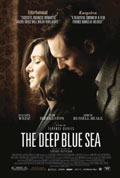
Directed by
Terence Davies
96 minutes
Rated M
Reviewed by
Bernard Hemingway

The Deep Blue Sea
Synopsis: The story of destructive love affair between the much younger wife (Rachel Weisz) of a staid British judge (Simon Russell Beale) and a RAF pilot (Tom Hiddleston)set in early 1950s London.
Terence Davies’s brilliant adaptation of a play by Terence Rattigan features a marvellous central performance by Rachel Weisz (perhaps the best of her impressive career) as Lady Hester Collyer, who gives up her privileged but deadly dull life for a passionate affair with a handsome flyboy Freddie Page, who can’t quite put the war behind him
As much a portrait of traumatized post-war Britain as it is a portrait of a traumatized woman who loves too much, Davies, who has already explored the era to good effect in Distant Voices, Still Lives (1988) and Of Time and the City (2008), brings the two aspects together in an opening scene in which Hester half-heartedly attempts suicide in the dowdy digs with its coin-in-meter gas fire which she shares with Freddie. This is still the England of Brief Encounter (1945) before the liberating winds of the Swinging ‘60s gave women a new sense of freedom, and Hester - her father a vicar, her husband a judge - bears a heavy burden of class and moral transgression, one which compounds her realization that Freddie will never love her the way she loves him. Hence the film’s title, a passion that brings misery on the one hand, a life of comfortable numbness on the other.
Davies opens the film with Hester’s failed suicide attempt and from there uses an a-chronolgical approach to depict her struggle (rather melodramatically boosted by American composer Samuel Barber’s impassioned 'Concerto for Violin and Orchestra') to take hold of her life. We see her in flashback as she recalls happy times with Freddie and not-so-happy with her husband and his repressively controlling mother (Barbara Jefford) and in the present as she faces both the men in her life who she knows in her heart can never match the love she has in hers.
Social history and lovingly re-created drabness aside however it is Hester’s pain and Ms Weisz’s extraordinary performance that is the centerpiece of the film with Freddie and Lord Collyer at best foils for Hester’s never quenchable, self-immolating passion.
FYI: Rattigan’s play was previously brought to the screen in 1955 with Vivien Leigh in the lead).

Want more about this film?


Want something different?




